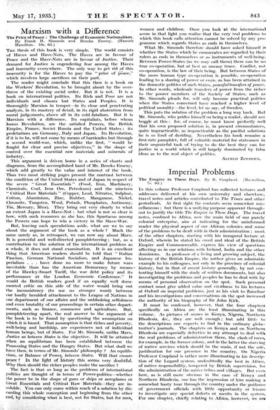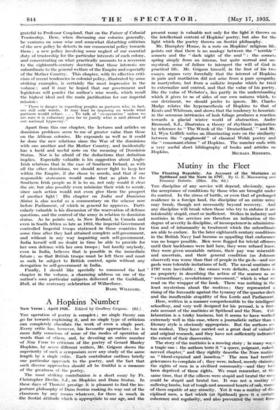Imperial Problems
IN this volume Professor Coupland has collected lectures and addresses delivered at his own university and elsewhere, travel notes and articles contributed to The Times and other periodicals. At first sight the contents seem somewhat mis- cellaneous ; but there is a unifying purpose apparent through- out to justify the title The Empire in These Days. The travel notes, confined to Africa, now the main field of our purely colonial enterprise, aim at indicating for the uninformed reader the physical aspect of our African colonies and some of the problems to be dealt with in their administration ; most of the other chapters, starting with his inaugural lecture at Oxford, wherein he stated his creed and ideal of the British Empire and Commonwealth, express his view of questions affecting us in our relations with Ireland, India and the other dominions. As professor of a living and growing subject, the history of the British Empire, the author gives an admirable example to his colleagues, not only in the province of colonial history, but in that of recent history generally, by not con- tenting himself with the study of written documents, but also investigating the problems and peoples he has to deal with by means of personal observation on the spot.. Such personal contact must give added value and vividness to his lectures at Oxford on imperial problems, just as his visit to Zanzibar and his investigations and conversations. On the spot increased the authority of his biography of it John Kirk.
It must be confessed, however, that the four chapters specifically on Africa arc the least illuminating in this volume. As pictures of scenes in Kenya, Nigeria, Northern Rhodesia, &c., they are well enough ; but add little to the descriptions one expects to fmd in - the ordinary globe- trotter's journals. The chapters on Kenya and on Northern. Rhodesia are especially defective in any attempt to deal with the real problems of administration there, the clash of races, for example, in the former colony, and in the latter the starving of native services which should be the main, if not the sole, justification for our presence in the country. On Nigeria Professor Coupland is rather more illuminating in his descrip- tion of the Lugard system, undoubtedly the best in Africa, of native responsibility, tempered by British supervision, for the administration of the native tribes and villages. But even here, as is still more obvious in the . case of Kenya and Northern Rhodesia, one has the impression of him making a somewhat hasty tour through the country under the guidance of government officials with little opportunity or leisure to investigate any special defects or merits in the system. For one chapter, chiefly relating to Africa, however, we are grateful to Professor Coupland, that on the Future of Colonial Trusteeship. Here, when discussing our colonies generally, he ventures on some wise and somewhat disturbing criticism of the new policy he detects in our commercial policy towards
them ; a new policy involving some neglect of our essential ,duty of trusteeship for the particular interests of each colony, and concentrating on what practically amounts to a reversion `to the eighteenth-century doctrine that those interests are subordinate to the general welfare of the Empire and especially of the Mother Country. This chapter, with its effective criti- cism of recent tendencies in colonial policy, illustrated by some -striking examples, is certainly the most impressive in the -volume ; and it may be hoped that our government and legislators will ponder the author's wise words, which recall 'the highest ideal and the main justification for our imperial mission :
" There is danger in regarding peoples as partners who, in fact, are still only wards. It may lead to imposing on wards what partners would refuse. . . . To talk of ' co-operation' unless we are sure it is voluntary goes far to justify what is said abroad of our national hypocrisy."
Apart from this one chapter, the lectures and articles on -dominion problems seem to me of greater value than those on the African colonies. He expounds as well as it could :be done the new relations since the War of the dominions with one another and the Mother Country, and incidentally has a lucid and useful note on the meaning of Dominion Status. Nor is he afraid of the deductions that - definition implies. Especially valuable is his suggestion about Anglo- Irish relations that in the case of Southern Ireland, as -with all the other dominions, we should never fight to keep her within the Empire, if she chose to secede, and that if our responsible statesmen would make that as plain to the Southern Irish people as it is to us, not only would it clear the air, but also possibly even minimize their wish to secede,
since such action would not even give them the prospect of another fight ! His chapter on India and Dominion Status is also useful as a commentary on the scheme now -before Parliament, of which in general he approves. Parti- cularly valuable is his discussion of the reservation of defence questions, and the control of the army in relation to dominion status. As he points out, in New Zealand, in Canada and even in South Africa as late as 1913, 'the imperial Government -controlled Imperial troops stationed -in- those countries for some time after they had attained complete self-government, and without in any way impairing such self-government. India herself will no doubt in time be able to provide for 'her own defence with her own troops ; but hardly anybody, even in India, believes that is possible in the immediate
'future ; so that British troops -must be left there and must as such be subject to British control, again without any -derogation to self-government in India.
Finally, I should like specially to commend the last chapter in the volume, a charming address on one of the 'author's own particular subjects delivered at the Guildhall, Hull, at the centenary celebration of Wilberforce.
BASIL WILLIAIIS.











































 Previous page
Previous page